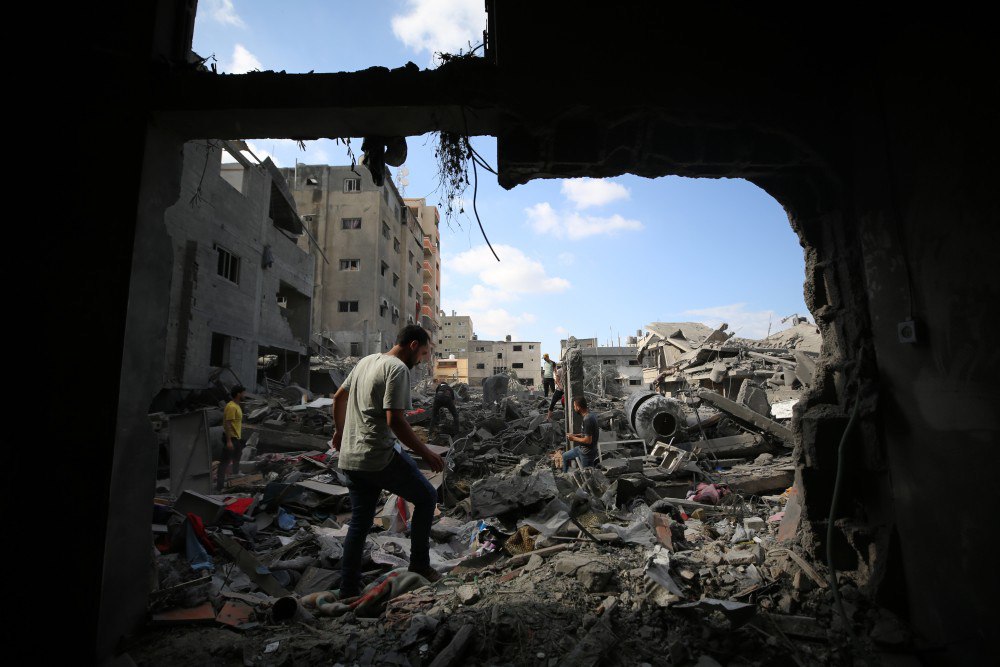The World Awaits a Peace Savior in the Great War
Israel-Hamas International Mediation Space
The world awaits a peace savior in the great war. These days, various international analysts and experts are discussing the international reactions to the escalating tension between Israel and Hamas. This report attempts to address the international reactions to the escalation between these two nations. The tension between Israel and Hamas has continued for almost the past two weeks, and it seems that key regional and international players can play a crucial role in finding potential solutions to this crisis. However, it is difficult to imagine which player is best positioned to play such a role.
President Joe Biden’s recent visit to Israel, although significant in expressing solidarity, raised suspicions that the U.S. Israel-Palestine policy is one-sided. Similarly, the European Union’s stance in this conflict appears somewhat complicated, with key EU officials expressing solidarity with Israel and various and differing positions adopted by different member countries.
Russia and China’s reaction to the October 7 attack also stirred controversy. Moscow refrained from condemning Hamas, and it seems that bilateral relations with Israel, which have traditionally been good, are experiencing a breakdown. China, in turn, does not seem interested in playing a mediating role in resolving the war, as it has avoided mediating between opposing parties.
Instead, it appears that both Moscow and Beijing intend to use this crisis as another opportunity to criticize U.S. policies and present themselves as opponents of the West’s contradictory and hypocritical policies, hoping to attract more supporters in the Arab world.
The United States’ Strategic Alliance with Israel Avoiding Gaza Occupation
President Biden, by likening Israel to a democracy almost similar to the United States, emphasizes his belief that Israel follows the rule of law rather than terrorist tactics. This narrative portrays the conflict as a struggle between democratic values and extremism, especially with institutions like Hamas. President Biden intends to emphasize Israel’s right to self-defense and also stress why the fight against Hamas should be supported by the Western world, as he believes this issue goes beyond U.S. interests.
Moreover, Joe Biden, expressing disappointment with the U.S. actions post-9/11 in Iraq and acknowledging past mistakes, advises Israel not to occupy Gaza, as he believes such an action could disrupt the path to forming a Palestinian state and, in turn, place Israel in the role of caretaker of the Palestinians, a responsibility it has often neglected.
Occupying Gaza could lead to significant public criticism and affect U.S.-Israel relations, making future U.S. commitments harder to justify to Congress and the American public.
The European Union and the Failure of the Oslo Accords
While European governments strive to respond to the tragic consequences of Hamas’s surprise attack, they must plan for the future, as now more than ever, a return to the previous status quo is neither possible nor desirable.
The ongoing violence is the most terrifying manifestation of the crumbling Oslo Accords, a plan that has steered international diplomacy for thirty years. The Oslo Accords refer to two agreements between the Israeli government and the Palestine Liberation Organization (PLO) that initiated the Israeli-Palestinian peace process and led to the establishment of the Palestinian Authority. The goal of this process was to reach a peace treaty based on UN Security Council Resolutions 242 and 338 and to realize the Palestinian people’s right to self-determination.
Additionally, the risks of Israel’s strategy to establish peace with the Arab world by bypassing the Palestinians—a strategy strongly supported by Europeans—highlight the need for a new solution and plan. In the future, Europe must consider a new initiative on how to revive a credible diplomatic path to ensure a dignified future for the people of Gaza and guarantee lasting peace and security for Israelis and Palestinians.
Russia Seeks to Gain from the Escalating Tension Between Israel and Hamas
Moscow consistently emphasizes that it is one of the few international powers that engages with all parties involved in the region. Therefore, the recent conflict between Israel and Palestine could put Kremlin diplomacy to the test.
On one hand, Russians must protect their relations with Tel Aviv, a partner that cannot be abandoned, especially for coordinated efforts and military cooperation in Syria. Israel has been a strategic partner for Moscow, and the Kremlin is well aware of this. On the other hand, they do not need to take a very strong stance against Hamas, partly due to their traditional position on the group but more importantly due to Hamas’s connection with Tehran, which is currently one of Moscow’s main military partners.
Thus, the likelihood of Russia seriously playing a mediating role in the current conflict is very low. The best Russia can do at present is to use the crisis to fuel anti-American narratives and claim that the current situation is the result of years of U.S. policy mistakes.
China’s Geopolitical View on the Conflict
China’s stance on the current Israel-Hamas war is somewhat complex. Beijing would certainly welcome the opportunity to mediate and assist in a ceasefire to enhance its credibility in the international community, especially after playing an effective mediating role in the agreement to restore diplomatic relations between Saudi Arabia and Iran earlier this year. However, China’s position and standing have been jeopardized with Israel due to Beijing’s past support for the Palestinian cause and struggle, despite broader economic exchanges between China and Israel compared to economic exchanges between Palestinians and China.
Furthermore, Beijing is likely to view this conflict through regional and geopolitical lenses. The country wants to strengthen and increase its support in the Arab world, which is outraged by Israeli attacks on the Gaza Strip, consequently positioning itself against the policies of Israel’s main ally, the United States.

